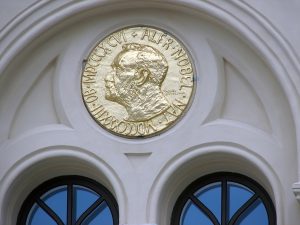South Korean author Han Kang has been awarded the Nobel Prize in Literature “for her intense poetic prose that confronts historical traumas and exposes the fragility of human life.” Han is the first South Korean, and the first woman from any Asian country, to be honored with the literary prize.
She’s also just the second South Korean to win any of the Nobel Prizes. Former President Kim Dae-jung won the Nobel Peace Prize in 2000 “for his work for democracy and human rights in South Korea and in East Asia in general, and for peace and reconciliation with North Korea in particular.”
In an interview with the Nobel Prize, Han said she was “ so surprised” and “honored” to have won. She said she had “just finished dinner with my son” on “a very peaceful evening” when a phone call broke the news.
Han is best known for her 2007 novel “The Vegetarian,” which won the Man Booker International Prize in 2016, after its translation into English. As The Diplomat’s Krzysztof Iwanek noted at the time, “The Vegetarian” was “the first originally Korean-language novel to claim the literary award.”
Iwanek’s overview of Han Kang’s novel noted that “The Vegetarian” offered a poignant look at some of the issues in South Korean society, including strict gender norms, as well as a sense of social isolation stemming from pressure to conform and “a world of workaholism.”
In other works, Han has touched on seminal episodes in Korean history. Her 2014 novel “Human Acts” centers on the 1980 Gwangju Uprising, which paved the way for South Korea’s eventual democratization. Her most recent novel, “We Do Not Part,” deals with the Jeju Uprising of 1948-49. Both historical incidents involved protests being violently suppressed by South Korea’s previous authoritarian government.
In her interview, Han expressed her hope that her award would inspire more interest in Korean literature: “I grew up with Korean literature, which I feel very close to. So I hope this news is nice for Korean literature readers and my friends, writers.”
President Yoon Suk-yeol congratulated Han, saying her Nobel Prize was “a monumental achievement in the history of Korean literature and a national celebration that brings joy to all the people.”
“You have transformed the painful wounds of our modern history into a great literary work,” Yoon told Han in a statement posted on Facebook. “I extend my deepest respect to you for elevating the value of Korean literature.”
Opposition leader Lee Jae-myung of the Democratic Party also offered his congratulations, calling Han’s win “news that envelops the whole body in joy.” He described Han as an author who “desperately sought human dignity in an era of violence and hatred.”
Yoon and Lee are normally bitter rivals; celebrating Han’s achievement is one of their rare moments of common ground.
South Korea’s National Assembly even paused an audit meeting to announce Han’s Nobel Prize and let legislators give a round of applause. “According to people present, the committee chamber then erupted with cheers and applause,” Korea JoongAng Daily reported.
Afterward, the chair of the Culture and Sports Committee, Jeon Jae-soo told the meeting that he hoped South Korea would also eventually be able to boast of Nobel Prizes “in the science and technology world.” He promised that South Korea’s ruling and opposition parties would work together “to further develop Korean culture and art.”
Arguably the world’s most famous South Koreans, the members of the global pop phenomenon BTS, also posted praise of Han and excitement over her win on their social media handles.
South Koreans more broadly responded with an outpouring of national pride on social media and intense interest in Han’s books.
The Associated Press reported that “some online bookstores temporarily froze following a sudden jump in traffic” after Han’s award was announced.

































